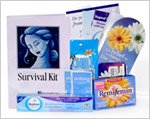Getting Help with Night Sweats…
Night sweats are one of the most common complaints of menopause which typically begins in a woman’s late 30s to early 50s. In fact, in a survey conducted by MenopauseRx, approximately 60% of women experience night sweats. Night sweats are part of a variety of symptoms referred to as vasomotor symptoms. Vasomotor symptoms result from the body’s thermoregulatory center responding to lower circulating hormones.
How to Cope…
A new study reports that 20 – 40% of adults have experienced night sweats in the past month, of which 50% of these adults complained of severe nights sweats (they required a change in bed clothes) and yet they have not reported these symptoms to their physicians.(1)
Oftentimes, night sweats can be so intense that they interrupt a woman’s sleep, which is associated with reduced quality of life.
The symptoms of night sweats can drastically disturb sleep patterns, making it difficult to wake up feeling rested. Because of this, women who suffer from night sweats often experience:
- Trouble concentrating
- Exhaustion during the day
- Irritability
- Heightened levels of stress
Fortunately, there are a number of ways to keep night sweats at bay. Here are a few strategies to consider:
- Look for patterns: Keep track of potential triggers (tobacco, diet, caffeine, and alcohol)
- Stay comfortable with moisture wicking clothing: Wick away moisture from the body and speed up the evaporation process, thus helping to regulate the body’s temperature as you sleep.
- Hormone therapy (HT): Many studies have shown that HT improves quality of sleep. Click here to learn more…..
- Breathe deeply: Relaxation breathing may help
- Complementary and Alternative therapy: including herbal remedies. Click here to learn more.….
- Exercise
“A recent study done at Penn State indicates that increasing cardio-respiratory fitness, including walking and yoga, could be a way to reduce menopausal symptoms. Other research from the University of Pittsburgh suggests that during menopause, overweight women have significantly more hot flashes and night sweats. Getting active and losing weight, of course, may not only reduce night sweats but can also positively affect your overall health and well-being.”(2)
Reference:
1. James W. Mold, MD, MPH, Suanne Goodrich, PhD and William Orr, PhD, Associations Between Subjective Night Sweats and Sleep Study Findings, The Journal of the American Board of Family Medicine 21 (2): 96-100 (2008)
2. Jessie Sholl, Menopausal Night Sweats: Why They Happen and How to Cope, Everyday Health, 10/13/2008.
 alth_center/assessment_meno.htm
alth_center/assessment_meno.htm



